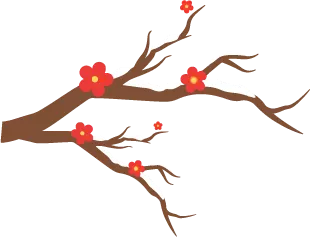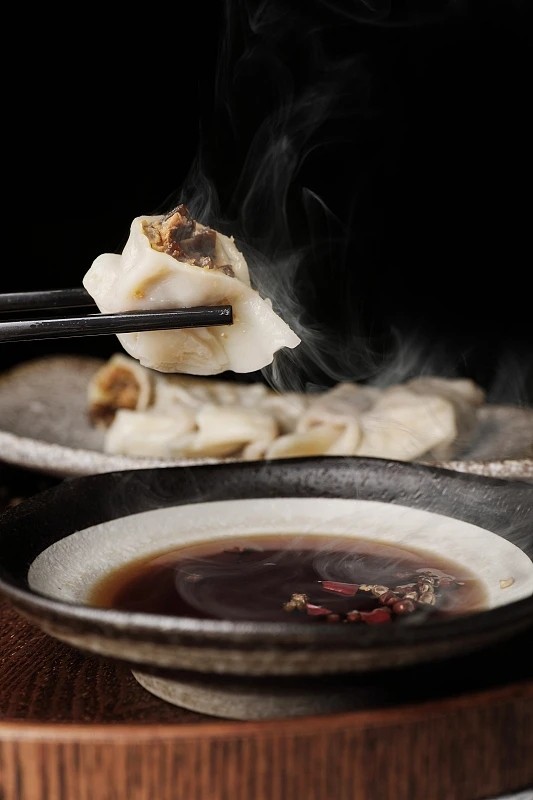“天时人事日相催,冬至阳生春又来”,今日冬至,老师和同学们打算怎么过出点儿仪式感呢?


冬至是中国传统二十四节气(the 24 traditional Chinese solar terms)中的第二十二个节气,英文为Winter Solstice。冬至发生在12月21日-12月23日之间。冬至当天,太阳几乎直射南回归线(Tropic of Capricorn),在这天,北半球的白昼时间达到一年最短,夜晚时间达到一年最长。
接下来就跟我一起来学习冬至相关的英文知识吧

Eating dumplings 吃饺子
During Winter Solstice in North China, eating dumplings is essential to the festival. There is a saying that goes "Have dumplings on the first day of Winter Solstice and noodles on the first day of Summer Solstice".
冬至时吃饺子是北方必不可少的节日饭。俗话说,“冬吃饺子夏吃面”。
People in Suzhou, Jiangsu province, are accustomed to eating wontons in midwinter. According to legend, during the midwinter feast 2,500 years ago, the King of Wu (one of the states during the Western Zhou Dynasty and the Spring and Autumn Period) was disgusted with all kinds of costly foods and wanted to eat something different. Then, the beauty Xishi came into the kitchen to make "wontons" to honor the king's wish. He ate a lot and liked the food very much. To commemorate Xishi, the people of Suzhou made wontons the official food to celebrate the festival。
苏州人在这天吃馄饨。传说2500年前,吴王吃腻了山珍海味,想尝试些不同的。于是美女西施为吴王准备的就是馄饨。吴王非常喜欢。为了纪念西施,苏州百姓就把馄饨作为冬至这天必吃的食物。

In places such as Shanghai, people eat tangyuan, a kind of stuffed small dumpling ball made of glutinous rice flour to celebrate Winter Solstice。
上海等地人们食用汤圆来庆祝节日。
In Yinchuan, Ningxia Hui autonomous region, people call midwinter the "Ghost Festival". On that day, it is customary for people there to drink mutton and vermicelli soup and eat the dumplings in the soup. They give the midwinter soup a strange name "brain" and share it with their neighbors。
在宁夏银川,大家称冬至为“鬼节”,这天的习俗是吃羊肉粉汤饺子。此外,他们还给这道美味起了个古怪的名字“头脑”。粉汤饺子做好后还要和邻居分享。
Offering nine-layer cakes to ancestors
九层糕祭祖
Taiwan residents keep the custom of offering nine-layer cakes to their ancestors. People with the same surname or family clan gather at their ancestral temples to worship their ancestors in order of their ages. After the sacrificial ceremony, there is always a grand banquet。
台湾地区的居民在这天仍保持着九层糕祭祖的习俗。同姓同宗者于冬至前后集中到祖祠中,照长幼之序一一祭拜祖先,俗称“祭祖”。祭典之后,还会大摆宴席,招待前来祭祖的宗亲们。

Eating red-bean and glutinous rice 吃红豆糯米粥
In some regions south of the Yangtze River on the first day of Winter Solstice, the whole family gets together to have a meal made of red-bean and glutinous rice to drive away ghosts and other evil things。
长江流域的一些地区在冬至这天全家人聚在一起吃红豆糯米粥来驱赶鬼怪。
Winter Solstice is the most important solar term and festival in winter in China. Ancient Chinese regarded it as an auspicious day, because the days would get longer after that day. Families reunited and worshipped gods and ancestors on the day in ancient times. For these reasons, there are many Winter Solstice poems being handed down. Here are five of the most beautiful Winter Solstice poems to appreciate.
冬至是中国冬季最重要的节气和节日,古代人们把这一天当做吉祥日,因为冬至过后,白天的时间会变长,在那一天,家庭团聚,祭祖拜神,因此,有很多关于冬至的诗词流传下来,以下为5篇最美的冬至诗,以供欣赏。
The Most Famous Love Poem on Winter Solstice 爱情 冬至夜怀湘灵 (白居易·唐) Missing Xiangling on Winter Solstice Night 艳质无由见,寒衾不可亲。 I can’t see my lover, and quilt is too cold to touch. 何堪最长夜,俱作独眠人。 Both of us sleep alone; how can we spend the longest night??
Xiangling was the author’s first lover, who grew up with the author as a neighbor. They fell in love but were not allowed to meet because their families were not matched in social status. Later, Bai Juyi went to Chang’an to pursue his study and career. Later, he wrote many poems to praise and mourn Xiangling.
湘灵是诗人的初恋,两人青梅竹马一起长大,他们相爱却因为门不当户不对而不能在一起,后来,白居易去长安求学,他后来写了很多诗来怀念湘灵。
Bai Juyi lay on the bed and could not sleep, especially on the Winter Solstice when other families reunited to celebrate the festival. Given that, he felt lonely and missed his lover much more. It is the most famous Winter Solstice poem about love.
白居易躺在床上无法入睡,尤其是在这个家人团聚庆祝节日的冬至日,他愈发感到孤单,十分思恋他的心爱之人,这是最有名的关于爱情的冬至诗。

Homesick Poem on the Festival
思乡
邯郸冬至夜思家 (白居易·唐) Homesick Winter Solstice Night in Handan 邯郸驿里逢冬至,抱膝灯前影伴身。 At the courier station of Handan on Winter Solstice night, my arms clasping my knees, only my shadow is accompanying me. 想得家中夜深坐,还应说着远行人。 My family might sit for a long time, talking about me now at this moment.?
This Winter Solstice poem is a vivid description of being homesick. The author was in the courier station in Handan and he cannot get home for the family reunion on the Winter Solstice. The weather was so cold, making him feel even lonelier and he clasped his arms around his knees to keep warm physically and mentally. Missing his family, he expected that they might stay up late to miss and talk about him far away.
这首诗是对思乡的生动描述,诗人在邯郸驿馆,冬至这天却无法回家与家人团聚,寒冷的天气使他愈发感到孤独,只能独自一人抱膝而坐以求安慰,想到家人,他们应该也还没有睡,在谈论思念着远方的自己吧。
Nostalgic Poem from an Old Soul
怀旧
冬至 (杜甫·唐) Winter Solstice 年年至日长为客,忽忽穷愁泥杀人。 Far from my hometown on Winter Solstice every year, I’m in such sorrow for my poverty. 江上形容吾独老,天边风俗自相亲。 Gaunt on the river far away from home, I miss my family so much. 杖藜雪后临丹壑,鸣玉朝来散紫宸。 Facing the valley with a stick, I think of old glorious days in the palace. 心折此时无一寸,路迷何处见三秦。 Every time at this moment, I feel lost and upset.?
This Winter Solstice poem was written by Du Fu in his late years, when he had been living a wandering life for many years. On the Winter Solstice, he was poor and stood at the valley’s edge with a stick, while others reunited with families to celebrate the festival happily. He can’t help missing his family and cherishing the memory of old days in the imperial palace. Each time when he thought of these and compared with his present life, he was quite upset and felt lost.
这首诗是杜甫晚年所作,当时他已颠沛流离多年,冬至那天,别人阖家团圆庆祝佳节,穷困的诗人却拄着拐杖踱步至荒山野壑,他忍不住想起家人,回忆起皇宫的日子,每每想起这些,再与现在的生活对比,不禁悲从中来。
Ode to Longer Daytime after Winter Solstice
冬至过后日渐长
减字木兰花 (阮阅·北宋) Shortened Magnolia Flowers Tune (a kind of poem pattern) 晓云舒瑞,寒影初回长日至。 Clouds fell away at this dawn; day would be longer since then. 罗袜新成,更有何人继后尘。 The socks for elders are newly woven; the custom should be handed down. 绮窗寒浅,尽道朝来添一线。 Warmer and warmer, shadow would also be shorter. 秉烛须游,已减铜壶昨夜筹。 As night turns to be shorter, weights for timing should also be reduced. ?
The author recorded that day time would be longer and longer, night time would be shorter and shorter, and the shadows would be shorter and shorter since that day. In addition, this Winter Solstice poem recorded an important custom. On this day, the young generations should send socks to the elders, in order to keep them warm as well as to send good wishes.
这首诗记录了冬至过后,白天会越来越长,夜晚越来越短,影子越来越短,此外,这首诗还记录了一个重要的习俗——冬至这一天,年轻一代要给长辈送袜子,既是为了保暖,也是为了送上美好的祝福。
The Most Optimistic Poem on Winter Solstice
最乐观的冬至诗
满江红.冬至 (范成大·宋) Azolla Tune (a kind of poem pattern) 寒谷春生,熏叶气、玉筒吹谷。 Spring sprouts in the cold winter; the aroma of new vanilla leaves fills in the valley. 新阳后、便占新岁,吉云清穆。 After the sunrise tomorrow, it would be a new wonderful year. 休把心情关药裹,但逢节序添诗轴。 Don’t be thinking about medicines all the time; write a new poem at the solar term. 笑强颜、风物岂非痴,终非俗。 It’s not a forced smile; I merely revel in fantastic nature. 清昼永,佳眠熟。门外事,何时足。 The day is long and I slept well. But when will things outside be satisfactory? 且团栾同社,笑歌相属。 It would be better to gather with like-minded friends to have a great time on this day. 著意调停云露酿,从头检举梅花曲。 We make good wine and study the ancient musical notations. 纵不能、将醉作生涯,休拘束。 Even though I can’t be drunk all the time, I am free at the moment.?
Different from other Winter Solstice poems, this poem is free from traditions. The author didn’t follow the festival customs, but spent his Winter Solstice with like-minded friends to enjoy his time in wine, music, poetry, painting, etc. He wouldn’t be trapped with mortal things, and he was free. His optimistic spirit influences everyone who reads this poem.
与其他冬至诗不同,这首诗没有遵循传统,诗人没有遵从节日习俗,而是和志同道合的朋友一起,在美酒、音乐、诗歌、绘画中度过这一天,他不被世俗之物所困,非常自由,他的乐观精神影响了每一个读过这首诗的人。
审编 杨斯琦

